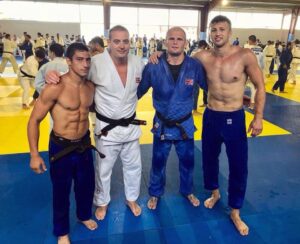
I realised while writing a recent post that, apart from the odd extremely brief description, I’ve never really given an account of what doing Judo full time looks like on a broad or, on a day to day basis. Obviously the four or five places offering full time training for Judo players across Great Britain will differ slightly but, won’t be a million miles away from each other in terms of lifestyle and structure.
Camberley Judo Club is where I have spent my full senior career so, again, my experience of full time training has been under Luke Preston so, therefore, is a reflection of how Luke, taking into account many differing variables, deems it best to train Judo athletes. Luke, following on from Mark Earle who built the club and first established the full time training at Camberley, under whom Luke himself trained.
Judo is a consistently evolving sport, regarding some elements I’ll discuss a mixture of how it was and, how it is now.
The absolute pinnacle of competitive Judo is the Olympic Games. For all those serious about competing I’ve ever known I’m yet to find anyone that’s not said that becoming Olympic Champion is their ultimate sporting dream. For me, it was watching the 1996 Atlanta Olympics that sowed the Olympic idea. I knew very quickly after Atlanta that Judo was all I really wanted to do.
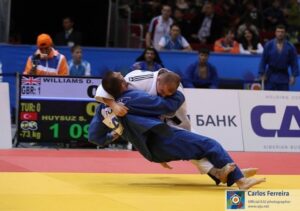
I skirted around the cadet (-16) and junior (-20) squads, some years medalling at the national championships and getting a place on the national team and some years not. There were a few things that fell into place for me to eventually bite the bullet and commit to Judo full time. I’ll try not to be too indulgent throughout, I’d like to keep this post as broad of a perspective on full time Judo as possible, as opposed to just my own personal story for the reader whom, I’m assuming, has little to no experience of full time Judo training. I will often use my own experience directly however, especially when attempting to more accurately describe larger decisions or pressures, to hopefully paint the reader a clear and more intimate picture.
So, a few things happened. At the beginning of 2008 I began to feel a dissatisfaction with being in the building trade, I actually liked the work but felt like I was trying to cover up the immense desire I had for Judo inside me; I started to seriously think about full time Judo. London had been announced as the host city of the 2012 Olympics a few years before, just a few months out of the Beijing 2008 Olympics I started to feel like time was running out, London would be the next Games. I won a bronze medal at the national championships and had managed to get on the national junior team for my last year as a junior. None of the other higher ranked lads did anything abroad so, I was given a crack at the Junior World Cup in Poland where I took a fifth place and then, off the back of that, selected for the Junior European & World Championships. That started to give me some belief, I always got a bit of a flogging when I went abroad up until that point, the result fell well for me. Because London was the host city of the 2012 Games we didn’t have to qualify a spot, the number one player in the country in each weight would be selected. The -73kg category in Great Britain didn’t have any World or European medallists in it at the time so was much more open for the taking compared to other weight groups. Luke was a coach on the junior team and I began to work with him on national squad trips, I then began to travel to Camberley for periods of training.
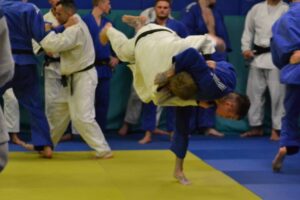
That was the Judo situation I found myself in towards the end of 2008. I was also coming into the final year of my plastering apprenticeship, begun to learn some plumbing, been accepted onto a plumbing college course, seen a mortgage adviser about my first place and, was still living with my single mother that had raised me on her own. For me, I was ready to relocate (from Shrewsbury) to go and train full time at the start of 2008, it was really the thought of moving to the other end of the country, away from my family and friends and, giving up a job (which I hadn’t fully finished training for) and the money that brought in that kept me toying with the idea and staying away for another 15 months. It was a massive decision for me, a real leap of faith. Anyway, after all the formerly mentioned fell into place it tipped the scales and I bit the bullet and moved to Camberley on March 26th 2009.
Judo is an amateur sport. UK Sport funding is used to send the national squad athletes on training camps and to competitions. For certain athletes that hit differing international results then APAs (Athlete Personal Awards) are provided, this is money for the individual, to contribute to ordinary living costs and personal sporting costs. For scope on numbers I have been funded twice, for 2.5 years in total, both times on a starting award of seven thousand pounds per year. There are different levels of funding increasing to the highest award of around thirty thousand pounds per year, that was for our high placing World Championship and Olympic level athletes. Many are surprised to hear that that is the level of funding, it would be that, around thirty grand a year for an Olympic Champion. Obviously a decent whack for just doing sport (none of us are curing cancer) but, in comparison to many other professional sports, Judo players have to have working careers when their competitive days are done. To summarise, an individual isn’t going to get rich through competitive Judo. Some players get personal sponsorships but of course they are never guaranteed. There has to be something after, for many that thought of ‘what am I going to do after this’ lives with them through their full careers, it finishes plenty of them early too.
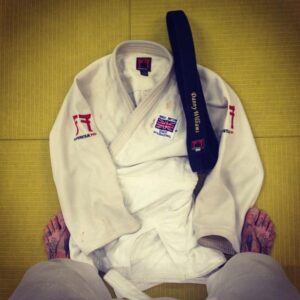
There are two expressions that can be heavily linked to dream chasing; ‘goal obsession’ and ‘paradise syndrome.’ A single minded pursuit of something that becomes very consuming, the realities of the outcome of whatever thing the individual pursues being somewhat distorted. The paradise syndrome being the achieving or obtaining of that goal followed by a ‘is that it feeling?’ knowing that life isn’t a pink fluffy cloud, nothing much actually changes the other side of that achievement. It can be anything, a new piece of clothing, a partner, sporting medal, record deal etcetera. I experienced something like that after the London Olympics, I was so fiercely driven to being British number one and going to the 2012 Games, that goal obsession was there but I didn’t even really know fully why I wanted it. I wouldn’t have been able to tell anyone what was gonna happen even if I bloody won the Olympics, all I knew is that was what I wanted. A lot, not all but a larger percentage, of serious Judo players I know seem to have that goal obsession, have experienced the paradise syndrome to some degree; I’m certainly no psychologist but I’d say they are heavy contributors to many committing to full time training, particularly in a lower money sport like Judo.
Committing to full time Judo is definitely a leap of faith. When I went full time in 2009, giving up a good job to do so the potential funding situation was something I had to take into account; if you were on the British squad you could have a number of your trips paid for by the national governing body. If you were number one or two in the country you could have more competitions and training camps provided. If you achieved a certain level of international results you could get onto the personal funding (APA) ladder, the higher level of results equating to a higher amount of funding. The APAs were regularly discussed and consistently chased. It was seen that, if you were willing to take that leap of faith and do whatever it takes training and lifestyle wise (living on little money) for a period, that that time was ‘investment’ that, at some point, could be repaid with results and, therefore funding, in which to be able to continue training and competing at a high level, but a bit more comfortably. Obviously results are never guaranteed so that adds to the pressure, it is something that is often considered greatly in the decision to commit. Plenty of none funded athletes were on the dole, myself included for a time initially. Akin to Eddie the Eagle having to sleep in his car, some of the stories of the lengths plenty of British Judo players have gone too over the years in order to survive and train full time are amazing. Listening to people that trained in places like Kendal back in the 1980’s and, seeing how well a lot of them had done, not only in their Judo careers but in many of their endeavours after finishing competing, I found very inspiring and motivating. Neil Adams talks about first moving to the Budokwai and having to steal bottles of milk off doorsteps in his book Life in Judo.
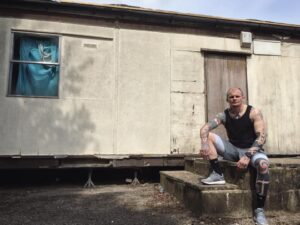
Wherever a player may be based there can often be an element of placing ones life on hold to a degree, even if studying or learning skills to provide for themselves after their competitive career is over. My friend Craig Fallon spoke to me once about feeling somewhat left behind, all his friends were getting married, buying properties, having kids, progressing in their professional careers and, had a level of security in their lives. I remember this conversation, towards the end of 2010, because I didn’t really get it, Craig had all these results that I was desperate for, I couldn’t really see passed that then. Once I decided to commit I literally didn’t care about anything else at all aside from competitive Judo for my first 5 years of being full time then, around the age of 24, I started to see what Craig talked about, all my peers began to progress in their outside lives, they were all getting married and mortgaged! I did, I started to feel a bit like I was, ultimately off the back of my own decisions, being left behind too.
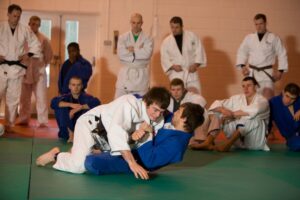
Doing the thing you’re passionate about is great but no doubt, for many, those things begin to eventually pull. That is something that I again thought long and hard about before taking the plunge and becoming a full time athlete. Although not knowing the full ins and out, I was fully aware that I was going to be doing something that required living a different lifestyle, schedule, activity and financially from the norm. Personally I battled those ideas for around 4 years until I was about 28 then, on coming to the actual realisation, I tried to tell myself this for a while before I actually believed it, I decided that there was no manual telling me I had to do certain things at a certain age, I could make money, have a family etcetera a bit later on; I had a lot of support around that, I was helped by my coaches and some older Judo and non Judo friends, most of whom said they wished that they had gone on fighting a bit longer or, followed their dreams instead of money first. My coach also helped me with getting onto coaching courses so that I had other options for when I finished competing. Tim Ferris speaks very strongly about this sort of thing, that someone is better off spending 10-15 years of their retirement in their twenties and thirties because it doesn’t matter if someone retires from work at 55 or at 70, at both those ages they will still be physically unable to pursue many of those things that they’d have liked to have as a younger person.
Ultimately I couldn’t have lived the rest of my life comfortably without knowing how far I could have got in competitive Judo, so, like many, I made the decision to enter into full time training, nearly 12 years ago. With no exception I know of no Judo athlete that has regularly been successful internationally as a senior and has not trained full-time for at least a sustained period of time, not one. It’s a necessity. I hope that has given the reader some small idea of what is taken into account before the decision to enter into full time training is made, some of the realities and thought patterns around it and, in some of the important periods during the full time training that can be trickier to navigate, that retire plenty of athletes early.
Part two next time where we’ll look at the day to day training.
Sign up to get my free weekly newsletter Judo’s Weekly Weigh In straight to your inbox!

